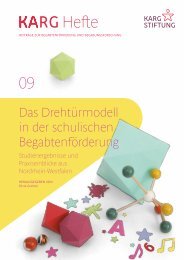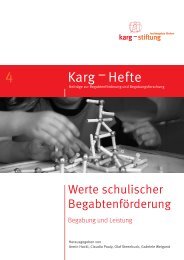FAQS: Frequently asked questions about giftedness
The Karg Foundation receives a lot of questions on the subject of giftedness—FAQs (Frequently Asked Questions)—far more often indeed than it did ten years ago. And this is a good thing! Many people involved in the educational processes of children have come to realize that giftedness can also be a fundamental personality trait of children and adolescents. The Karg Foundation wants to answer the questions you may have not only as educational and psychological professionals in educational institutions or working as educational providers, policy makers, or in training and further education institutes, but as parents and gifted people also: What is giftedness? How can it be identified? Who can provide advise for gifted children and their families? How can they be supported in the best possible way?
The Karg Foundation receives a lot of questions on the subject of giftedness—FAQs (Frequently Asked Questions)—far more often indeed than it did ten years ago. And this is a good thing! Many people involved in the educational processes of children have come to realize that giftedness can also be a fundamental personality trait of children and adolescents.
The Karg Foundation wants to answer the questions you may have not only as educational and psychological professionals in educational institutions or working as educational providers, policy makers, or in training and further education institutes, but as parents and gifted people also: What is giftedness? How can it be identified? Who can provide advise for gifted children and their families? How can they be supported in the best possible way?
You also want an ePaper? Increase the reach of your titles
YUMPU automatically turns print PDFs into web optimized ePapers that Google loves.
What is the nature of<br />
<strong>giftedness</strong>?<br />
Achievement in different areas, such as mathematics,<br />
sports, or music, are partly due to different factors. Thus,<br />
different types of <strong>giftedness</strong> can be differentiated: Whereas<br />
intellectual <strong>giftedness</strong> facilitates exceptional performance<br />
in the intellectual domain, athletic <strong>giftedness</strong> refers to a<br />
high potential for athletic achievement and musical <strong>giftedness</strong><br />
refers to a high potential for achievement in the<br />
field of music.<br />
Regardless of the specific type of <strong>giftedness</strong>, the fact<br />
remains that <strong>giftedness</strong>, as a person’s high achievementrelated<br />
developmental potential, always encompasses<br />
several components. In addition to abilities such as high<br />
intelligence in the case of intellectual <strong>giftedness</strong>, high<br />
athleticism in the case of athletic <strong>giftedness</strong>, or high musicality<br />
in the case of musical <strong>giftedness</strong>, these are primarily<br />
personality traits, which contribute to an individual’s<br />
own development. This includes, for example, being open<br />
to new experiences and ideas or a high level of motivation<br />
and a desire to learn. And finally, as potential develops<br />
into achievement, the challenges change—which in turn<br />
changes the nature of what is considered to be high development<br />
potential. An example: Musically gifted children<br />
demonstrate a particular appreciation of music, an excellent<br />
memory for melodies, and teach themselves the basic<br />
principles of playing the piano. The first piano lessons now<br />
introduce the requirement of practicing, which additionally<br />
calls for perseverance and at times the ability to tolerate<br />
frustration. And later, when auditioning for the first<br />
time, strong nerves and self-confidence are needed as well.<br />
Giftedness is neither static nor unchangeable. Rather,<br />
a person’s <strong>giftedness</strong> can be described as his or her individual<br />
profile of abilities, personality traits, and learned<br />
skills that are likely to result in positive achievement development<br />
at the present time—and therefore represent a<br />
high achievement-related development potential.<br />
10 11
















